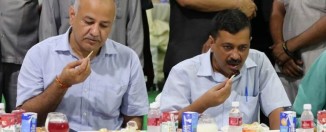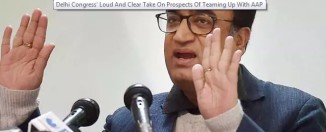Meet India’s first woman DGP turned AAP’s Haridwar hopeful
Remember Udaan on Doordarshan? The popular TV series that enthralled middle class Indians in the late 80s? It wove a narrative around a girl called Kalyani Singh, who joins the police force after seeing her father’s land being forcibly taken away and struggles to transform a very unreceptive system to make it accessible to the common man. Written and directed by Kavita Choudhary, who also essayed the lead protagonist’s role, it was inspired by the real life story of her own sister Kanchan Choudhary Bhattacharya India’s first woman DGP (Director General of Police) and now an aspiring politician, fighting on an Aam Aadmi Party ticket from Haridwar.
“I vividly remember seeing my dad being brutally beaten up. I have known what it feels like to be dispossessed of one’s own land, going from place to place to get an FIR registered but in vain,” Bhattacharya tells me on the phone from Haridwar where she’s been busy campaigning in the villages over the past few days. “That is what propelled me to join the police 40 years ago, and unfortunately so many years later the same issues have pushed me into politics. I’ve been deeply troubled by how little voice the common man has in India at present.”
Bhattacharya, an IPS officer of the 1973 batch, and also the second woman officer in the country after Kiran Bedi has done a lot of things in life on impulse. Her decision to enter politics was also a leap of faith. She approached the Aam Aadmi Party as a volunteer only in February this year, with not an inkling that a month later she would be thrown in at the deep end. It was a party meeting in Dehradun where she saw a gathering of sincere, committed members brainstorming ideas and discussing real problems with the locals that convinced her to take the plunge.AAP offered her a ticket from Haridwar where she had spent many a summer holiday at her nani’s home. Uttarakhand was also where she was appointed DGP.
A bastion of the Bharatiya Janata Party through the 1990s, the Haridwar constituency has seen MPs from the Samajwadi Party and the Congress occupy the chair in the last two general elections But having won four out of six civic body polls in Uttarakhand last year, the BJP has seen its stock rise in the state again, with opinion polls expecting a sweep for the saffron party.
More than a BJP wave, however, funding is a more critical concern for Bhattacharya.
“I simply have no finances. My husband has given me a bit of money, I’ve dipped into my savings for some more but that’s about it. Anyhow I am sure god will find a way out,” she states nonchalantly, telling me how she has, time and again in life, emerged as an unlikely victor. “When I joined the police, they told me at a conference in Hyderabad that I was least likely to succeed because I didn’t fit into the mould, that I was sensitive and thin skinned. But I became India’s first woman DGP. Today they may bet against me because I don’t have the funds, but who knows I might just spring a surprise.”
Employment, women’s empowerment, a cleaner Ganga, disaster preparedness and the environment are among the key planks on which she is planning to fight the elections. Married to a man who is at the epicenter of corporate life – Dev Bhattacharya, the Group Executive President of Corporate Strategy and Business Development at Aditya Birla Group, she also wants to debunk the myth that AAP is anti-industry.
“The first question I asked them when I decided to contest was about their belief on industrial development. I have no doubt in my mind that they do not want to see the country go backwards,” Bhattacharya insists, saying that the best thing about her party is its willingness to learn and evolve.
And how does she feel about the fact that her more prominent former colleague and BJP supporter Kiran Bedi has turned a political adversary?
“To each his own. She is a fine woman with a lot of guts and I admire her. She must have her own reasons for doing what she did. We have to each walk our own trail, there is no point dwelling on these things,” she says as we start wrapping up the conversation. But not before gently reminding me that I must highlight the point about funding.
“Through my life I’ve been embarrassed to ask people for money. I don’t know how I’ll be able to do it today, but I am trying.”
Nothing could sound more bizarre, coming from a politician’s mouth. But then Bhattacharya is not just any other politician, is she?!





